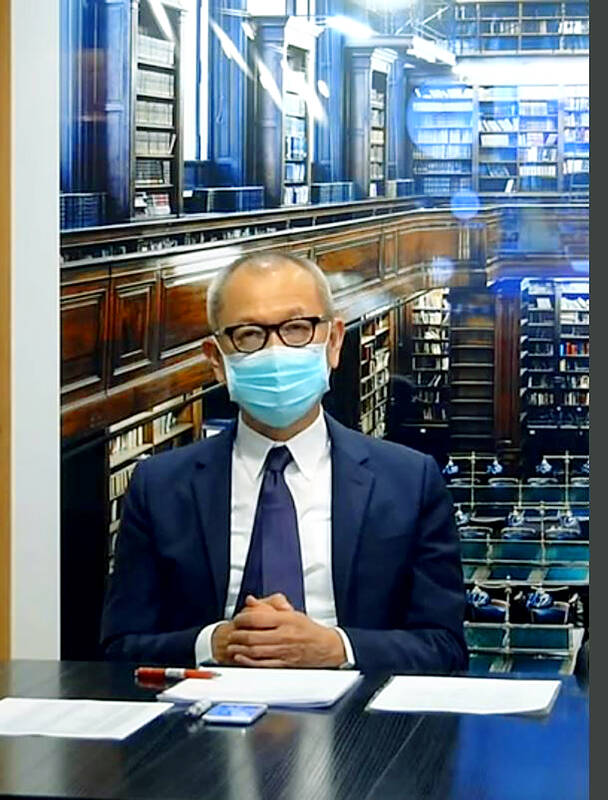Yageo Corp (國巨), the world’s third-largest multilayer ceramic capacitor supplier, has entered into a binding commitment with France-based Schneider Electric to acquire its sensors business for about NT$12.4 billion (US$386.2 million) in cash, further expanding its presence in the world’s sensor market, the company said yesterday.
The latest acquisition proposal came after Yageo earlier this month announced its plan to acquire a sensor business from Heraeus Holding GmbH in a cash deal worth NT$2.84 billion.
The proposed transaction is part of Yageo’s strategy to expand its premium product and high-end product portfolios, the company said in a statement yesterday.

Photo: Chang Hui-wen, Taipei Times
“The proposed acquisition will be a major milestone for us to further strengthen our position in the sensor market, which will be a significant growth driver for Yageo,” Yageo chairman Pierre Chen (陳泰銘) said.
“We will be able to deliver an even more comprehensive product portfolio for our customers from passive components to a broad range of high-end electronic components,” Chen said.
Yageo aims to boost its annual revenue to above US$600 million, with about 14 percent of revenue coming from sensors, it said.
The proposed transaction values Schneider Electric’s Telemecanique Sensors business at an enterprise value of 723 million euros (US$726 million), with an estimated equity value of about 686 million euros, it said.
Schneider Electric would grant Yageo a license to use the Telemecanique Sensors name, and Yageo would obtain the relevant sensor patents, it said.
Telemecanique Sensors is a leading global specialist in the design, development and delivery of mission-critical electromechanical and electronic sensors. It generated about 280 million euros in revenue last year. With more than 90 years of experience, the company has built a broad portfolio of sensing solutions including high-end limit switches, proximity sensors and pressure sensors, it said.

Shares in Taiwan closed at a new high yesterday, the first trading day of the new year, as contract chipmaker Taiwan Semiconductor Manufacturing Co (TSMC, 台積電) continued to break records amid an artificial intelligence (AI) boom, dealers said. The TAIEX closed up 386.21 points, or 1.33 percent, at 29,349.81, with turnover totaling NT$648.844 billion (US$20.65 billion). “Judging from a stronger Taiwan dollar against the US dollar, I think foreign institutional investors returned from the holidays and brought funds into the local market,” Concord Securities Co (康和證券) analyst Kerry Huang (黃志祺) said. “Foreign investors just rebuilt their positions with TSMC as their top target,

Nvidia Corp chief executive officer Jensen Huang (黃仁勳) on Monday introduced the company’s latest supercomputer platform, featuring six new chips made by Taiwan Semiconductor Manufacturing Co (TSMC, 台積電), saying that it is now “in full production.” “If Vera Rubin is going to be in time for this year, it must be in production by now, and so, today I can tell you that Vera Rubin is in full production,” Huang said during his keynote speech at CES in Las Vegas. The rollout of six concurrent chips for Vera Rubin — the company’s next-generation artificial intelligence (AI) computing platform — marks a strategic

REVENUE PERFORMANCE: Cloud and network products, and electronic components saw strong increases, while smart consumer electronics and computing products fell Hon Hai Precision Industry Co (鴻海精密) yesterday posted 26.51 percent quarterly growth in revenue for last quarter to NT$2.6 trillion (US$82.44 billion), the strongest on record for the period and above expectations, but the company forecast a slight revenue dip this quarter due to seasonal factors. On an annual basis, revenue last quarter grew 22.07 percent, the company said. Analysts on average estimated about NT$2.4 trillion increase. Hon Hai, which assembles servers for Nvidia Corp and iPhones for Apple Inc, is expanding its capacity in the US, adding artificial intelligence (AI) server production in Wisconsin and Texas, where it operates established campuses. This

US President Donald Trump on Friday blocked US photonics firm HieFo Corp’s US$3 million acquisition of assets in New Jersey-based aerospace and defense specialist Emcore Corp, citing national security and China-related concerns. In an order released by the White House, Trump said HieFo was “controlled by a citizen of the People’s Republic of China” and that its 2024 acquisition of Emcore’s businesses led the US president to believe that it might “take action that threatens to impair the national security of the United States.” The order did not name the person or detail Trump’s concerns. “The Transaction is hereby prohibited,”